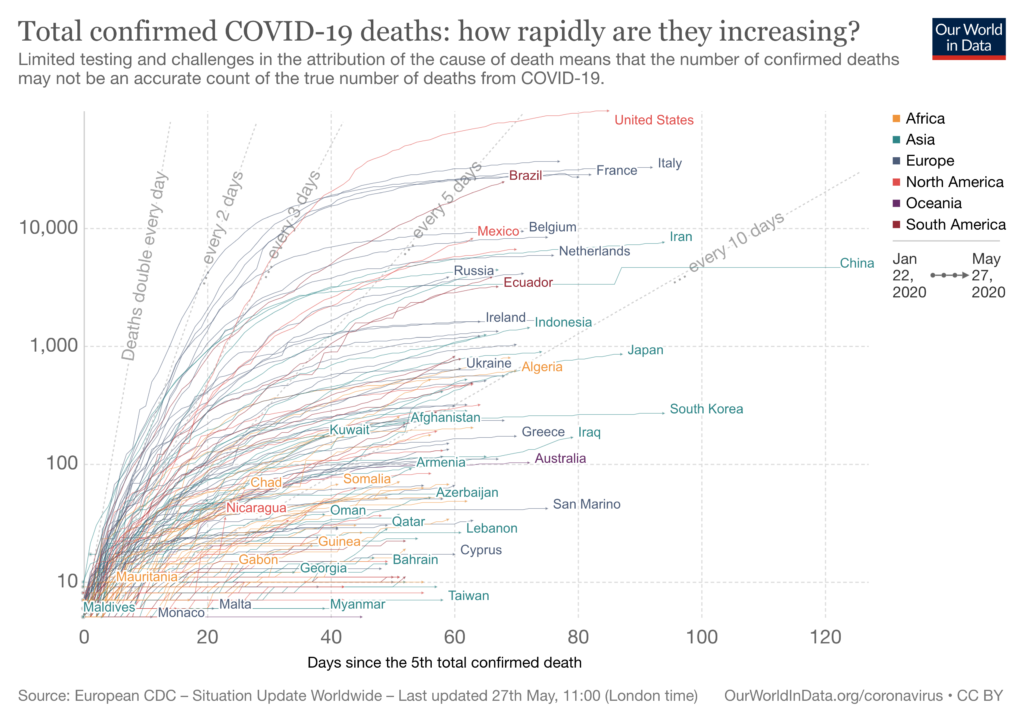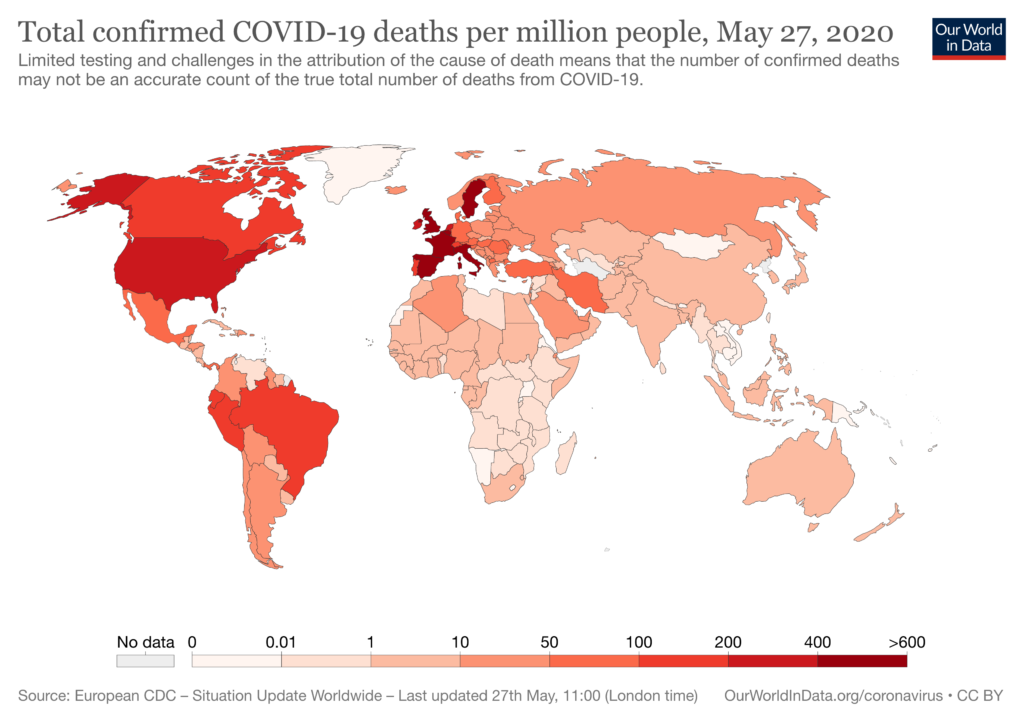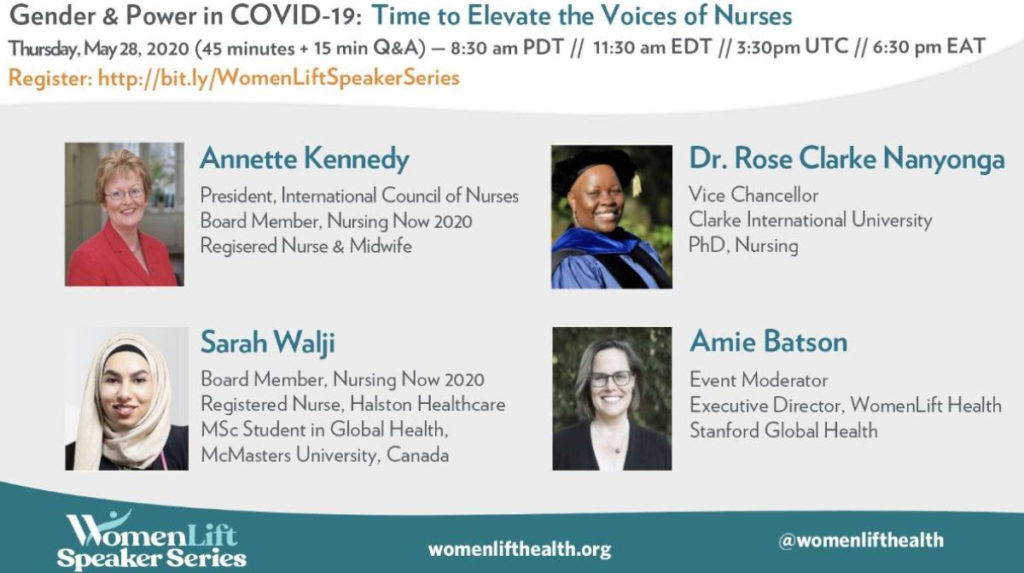Published: 05/29/2020
Dear Global Health Colleagues,
This COVID-19 newsletter comes on the heels of the 73rd World Health Assembly where Member States met virtually to discuss the health, economic and political aspects of COVID-19. The Assembly concluded with a shared global commitment to the COVID-19 response and Member States reaffirmed their commitment to health equity during the pandemic. We applaud the World Health Organization’s leadership, and we call for the US and others to strengthen and reinforce WHO’s role in the COVID-19 response rather than pull back resources.
In this newsletter, we highlight the ongoing human rights issues facing the world during the global pandemic. The best article I have read recently on ethical issues of allocation in times of scarcity for COVID 19 is by Ezekial Emanuel et al and can be read in NEJM. I am also looking forward to an important discussion tomorrow on Prioritizing Equity: The Root Cause.
I’d also like to draw your attention to the selected articles below focused broadly on gender, planetary health as well as regional news and underserved populations. As this is the international year of the Nurse WomenLift Health speaker series: Gender & Power in COVID-19 will be highlighting global nursing challenges.
As always in solidarity against COVID-19,
Michele Barry
Drs. Ben and A. Jess Shenson Professor of Medicine and Tropical Diseases
Director of the Center for Innovation in Global Health
Senior Associate Dean for Global Health, Stanford University


Continue to monitor the following reliable websites for the global situation:
NIH/NLM | LitCovid—–LitCovid is a curated literature hub for tracking up-to-date scientific information about the 2019 novel Coronavirus. It is the most comprehensive resource on the subject, providing a central access to relevant articles in PubMed. The articles are updated daily and are further categorized by different research topics and geographic locations for improved access.
New website to watch – A collaboration between the University of Washington MetaCenter for Pandemic Preparedness and Global Health Security and Strategic Analysis, Research & Training (START) Center to provide a succinct summary of the latest scientific literature related to the COVID-19 pandemic. To subscribe click here.
Resources
Global Trends and Topics
Historic Health Assembly ends with global commitment to COVID-19 response (5/19/20): This news brief summarizes a landmark resolution made during the World Health Assembly to intensify global pandemic control and ensure equitable distribution of life-saving commodities.
Ending Violence Against Women and Girls COVID-19 Response (5/15/2020): This policy brief by UN Women Africa provides key solutions to increased violence against women and girls caused by the COVID-19 pandemic.
Abortion during the Covid-19 Pandemic – Ensuring Access to an Essential Health Service (5/7/20): This perspective sheds light on the lack of abortion access and restrictive policies in the United States during the COVID-19 pandemic.
Will the Pandemic Make the West More Vulnerable to Forest Fires? (5/14/20): This New York Times opinion piece focuses on the threat of forest fires in the United States West that has been exacerbated by the global pandemic.
COVID-19: A Matter of Planetary, not Only National Health (5/18/20): This perspective written by Dr. Michele Barry and Ashley Jowell calls for leaders to focus on taking actions to improve planetary health to mitigate the effects of future pandemics.
Regional News
COVID-19 Could Worsen Gender Inequality in Latin America and the Caribbean (4/23/20): This feature story from the World Bank sheds light on the issues of gender inequality, including domestic violence and participation in the labor market, that are heightened due to the COVID-19 pandemic.
Leveraging Africa’s preparedness towards the next phase of the COVID-19 pandemic (5/14/20): This Lancet comment focused on the preparations, including technology innovation and sustained containment, that will need to be leveraged in order to combat the next phase of the COVID-19 pandemic in African countries.
Domestic Underserved Populations and Health Disparities
Stereotype Threat (5/23/20): This perspective in The Lancet showcases the issue of stereotype threat when considering how the pandemic relates to different ethnic and racial groups.
Off the back burner: diverse and gender-inclusive decision-making for COVID-19 response and recovery (5/7/2020): This commentary in BMJ discusses the need for gender-inclusive decision making during the COVID-19 response.
Upcoming Events and Lectures

Thursday, May 28, 2020 from 8:30 AM (PT)
Gender & Power in COVID-19: Time to Elevate the Voices of Nurses
In 2020 – the International Year of the Nurse and Midwife – nurses have taken center stage. As COVID-19 cases continue to surge in many parts of the world, nurses are playing an instrumental role to provide quality care and save more lives, sometimes with great personal sacrifice to their physical and mental health. This is not new: nurses have consistently helped the world tackle health emergencies. From the Taiwanese nurses who developed new strategies to confront the SARS outbreak, to the Liberian nurses who kept caring for patients at the height of the Ebola emergency, nurses are central to pandemic and recovery responses.
Like many others on the frontlines, the vast majority of the world’s nurses are women and few hold positions of power in global health, despite strong evidence that this would improve overall health outcomes. Historically, nurses’ needs and perspectives have not been adequately reflected in policy or funding decisions, which is again playing out on the global stage. Now, more than ever, as nurses boldly move forward – putting their lives at risk for their communities – we must deliver the resources and tools they need to do their jobs. Hear from a powerhouse panel, including Dr. Rose Clarke Nanyonga, Vice Chancellor, Clarke International University; PhD, Nursing, Annette Kennedy, President, International Council of Nurses; Board Member, Nursing Now 2020; Registered Nurse & Midwife and Sarah Walji, Board Member, Nursing Now 2020; Registered Nurse, Halston Healthcare as they demand the world take action to support nurses during this pandemic and beyond.

Thursday, May 28, 2020 at 10:00 AM (PT)
Prioritizing Equity: The Root Cause
Hear diverse perspectives on health equity, from trailblazers to current advocates, whose work is driven by the mission to address the root causes of health inequity and the social determinants of health.
New Funding Opportunities Specific to COVID-19
Online List of COVID-19 Research Opportunities
Stanford’s Research Management Group has created a website that provides a complete listing of funding opportunities for COVID-19 research. The site also provides sponsor and University guidance on grants, clinical trials, and award management impacted by COVID-19.
Other Stanford Global Health News
Global Health Equity Scholars Fellowship Program announces 2020-2021 Fellows
Each of our new fellows were competitively selected to receive mentored training at a top ranked international NIH research site and to build international research collaborations between the U.S. and low- and middle-income countries (LMIC) to address a wide range of health issues that arise out of urban and rural informal human settlements. This year our Stanford fellows are:

Rehnuma Haque, MBBS, MPH, PhD LMIC Research Fellow
Infectious Diseases
International Centre for Diarrhoeal Disease Research, Bangladesh

Keli Gerkin, BS, DMV, US Postdoctoral Research Fellow
Veterinary Medicine, Infectious Diseases, Epidemiology
Kenya Medical Research Institute

Nicole Starr, MPH, MD, US Postdoctoral Research Fellow
Surgery, Trauma, Epidemiology, Surveillance, Health Systems
Addis Ababa University
Stanford MD Candidate, Hannah Wild, Selected for Gates Foundation Grand Challenges Grant

Hannah Wild, a Stanford MD candidate, has been selected as a grant recipient for the Bill & Melinda Gates Foundation Grand Challenges: Innovations for Improving the Impact of Health Campaigns (Round 24).
Hannah will develop a modelling-based approach that uses remote sensing and geospatial analysis to include neglected and high-risk nomadic populations in health databases and for campaign planning. Hannah and her team will design algorithms and methods that use satellite imagery and open access geospatial data to capture population movements over time, which will be validated in the Ethiopia. They will also develop the technical infrastructure to scale these methods and produce automated packages and best-practice guidelines so they can be implemented in a variety of low-resource settings.
To learn more about Hannah’s work, please read this 2019 Stanford News article.
Stanford Global Health Partners with TeachAids to Develop and Distribute New COVID-19 Resources
CoviDB is a community-edited platform organizing resources across a comprehensive set of topics relating to COVID-19 for public use. The site was launched by TeachAids with faculty and students from Stanford, Dartmouth, and other universities. TeachAids is a 501(c)(3) nonprofit social venture spun out of Stanford University that creates breakthrough software addressing numerous persistent problems in health education around the world. CoviDB’s first content initiative, the CoviDB Speaker Series, brings together some of the world’s leading experts in medicine, public health, technology, economics, and other subjects, to answer more detailed questions relating to COVID-19 than generally appear in mainstream media outlets. Previous speaker series recordings can be found here.